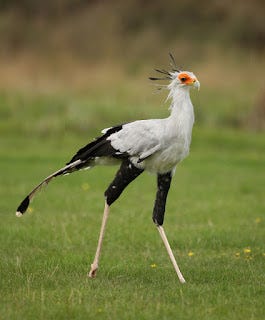Are Penguins Kosher?
After giving a live online tour of the Hall Of Kashrut at the Biblical Museum of Natural History this week, for Kushner Hebrew Academy, I received the following feedback and question from the Director of Jewish Studies, Rabbi Yaacov Feit:
Thank you so much for this morning's exceptional and enjoyable presentation. Beyond your expertise in the field combined with your sense of humor and ability to present I really appreciated how you worked the chat so well to allow for participation even remotely. This was an opportunity to really capitalize on our unfortunate situation and bring their Torah study to life. Tizkeh Lemitzvos! My students asked me why penguins aren't kosher. Any thoughts?

I've been asked this question a few times over the years, and I've given it a lot of thought. Initially, it would appear that penguins should be kosher. After all, the only birds that are not kosher are the two dozen types of birds listed in the Torah as being not kosher. Now, while there is some dispute as to the identities of these birds, nobody suggests that one of them is a penguin! True, the Torah's list of "types" (minim) is not a list of zoological species, and one type could include many similar species (such as the atalef, which includes one thousand species of bats). But penguins are extremely dissimilar from all the birds in the Torah's list and would not be included in the same "type." Thus, it would initially appear that a penguin would be kosher (albeit that the lack of mesorah would prevent people from eating it).
However, in fact, matters are not so straightforward at all.
First of all, one must ask whether the penguin is a bird, in the Torah system of classification. As I discuss at length in the Torah Encyclopedia of the Animal Kingdom, the system of taxonomy used in the Torah is very different from that of modern zoology. "Ohf" includes bats, which are mammals, because it does not refer to "birds," per se. One might then argue that the penguin is not an ohf, because it does not fly! Accordingly, there would be no basis to permit it.

However, according to the Gemara (albeit disputed by Yehudah Feliks), one of the other birds in the Torah's list is an ostrich, which does not fly either. And in any case, it would not be correct to say that ohf means "flying creature." The Torah's classification is a "folk taxonomy" (this is not an insulting or heretical term; it is an academic term with a specific meaning described in my encyclopedia). There aren't specific criteria to be an "ohf." Rather, it means something "birdish." Things can be birdish in different ways. Bats are birdish because they fly. Ostriches are birdish because they have beaks and two legs and feathers. Accordingly, penguins would also be in the category of ohf. (Though perhaps a case could be made that the kiwi bird is a sheretz rather than an ohf.)
So, given that the penguin is a "bird" in the Torah classification, and it is not mentioned in the Torah's list of non-kosher birds, does that mean that it is kosher? I would strongly argue that it is not kosher. But in order to explain why, we'll have to first discuss a different bird: the secretary bird.

The secretary bird, as those who have joined my Africa trips (or remember the old Disney film Bedknobs & Broomsticks) will know, is a very unusual bird. Its basic body (and beak) shape is that of a bird of prey, but it has a long tail, and exceptionally long legs, like a flamingo. It also has a remarkable crest of feathers sprouting from its head, like a writing-quill stuck behind the ears, which earns its name. The secretary bird lives only in sub-Saharan Africa, and is definitely not in the Torah's list of non-kosher birds. Nor could it reasonably be described as being included in the same min as one of the birds in the Torah's list, since it looks so utterly different from all of them.
On the other hand, there is absolutely no way that a secretary bird can be kosher. It's a bird of prey! It eats snakes and mongooses and hares and even young gazelles. Ramban states that the fundamental reason for non-kosher birds being non-kosher is that they are predatory. And while it seems to be a difficult overreach to say that it's the only reason for birds being non-kosher (since it would not account for certain non-kosher birds such as hoopoes and bats), it would seem clear that it is a sufficient reason. And the Mishnah in Chullin states explicitly that all predatory birds are not kosher.
There's just no way, conceptually or halachically, that a secretary bird could be kosher. And yet it's not one of the birds in the Torah's list of non-kosher birds!
The only possible answer is that the Torah's list of non-kosher birds is not comprehensive. Rather, following the Talmudic-based principles that I developed in my encyclopedia and in my book The Camel, The Hare & The Hyrax, we can say as follows. The animals of the Torah are the animals of Biblical lands. The four animals listed as possessing only one of the three kosher signs are the sole such animals in that region, not in the entire world. The ten types of mammals listed in Parashas Re'ay as being the kosher mammals are the sole such animals in that region, not in the entire world - the moose, chevrotain and okapi are also kosher. Likewise, the two dozen birds listed as being non-kosher are the non-kosher birds of that region, not of the entire world.
Now, this is the kind of thing that immediately gets the Kefira Cops revving up and ready to slam me as a heretic. But, after I came up with this approach, I then discovered that it's actually a Tosafos!
The Gemara in Chullin states that the Torah gives the most concise way of telling us which creatures we may and may not eat. Since there are more kosher birds than non-kosher birds, the Torah lists only the non-kosher birds. Now, Rashi explains this to mean that there are no non-kosher birds in the entire world other than the two dozen listed (which can only include other birds of the same type/min). But Tosafos (Chullin 61a) says that this does not have to be what the Gemara is saying. Rather, the Gemara could mean that listing the two dozen non-kosher birds gives us a way to identify which types of birds in general are not kosher, i.e. those which have similar characteristics to the birds listed! Baruch shekivanti.

Accordingly, since the non-kosher birds listed in the Torah include predatory birds, we can extrapolate and conclude that the secretary bird is not kosher. And since the list also includes "aberrant" birds such as ostriches and bats, kiwis would likewise not be kosher. And since it also includes fishing birds such as cormorants and gulls, penguins would likewise not be kosher!
Meanwhile, if you'd like to join our live online tours of the Biblical Museum of Natural History - or perhaps sponsor a program for your local shul or school - please see www.BiblicalNaturalHistory.org/live for details. As Rabbi Feit attested, this is an exceptional way to really capitalize on the world's unfortunate situation and bring Torah study to life!


